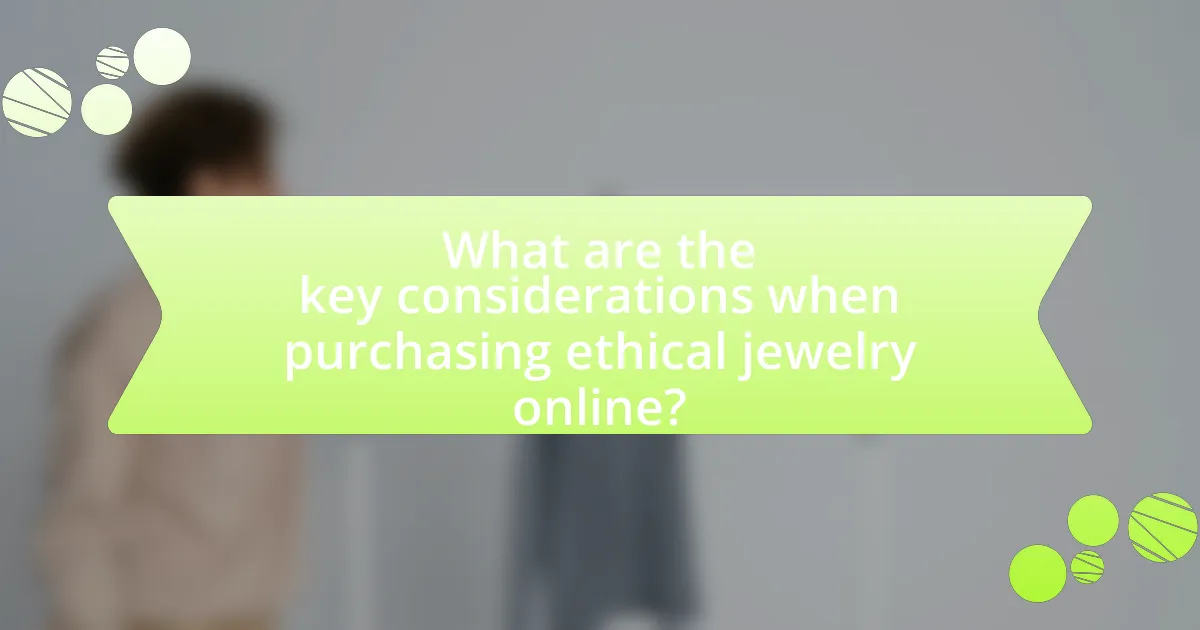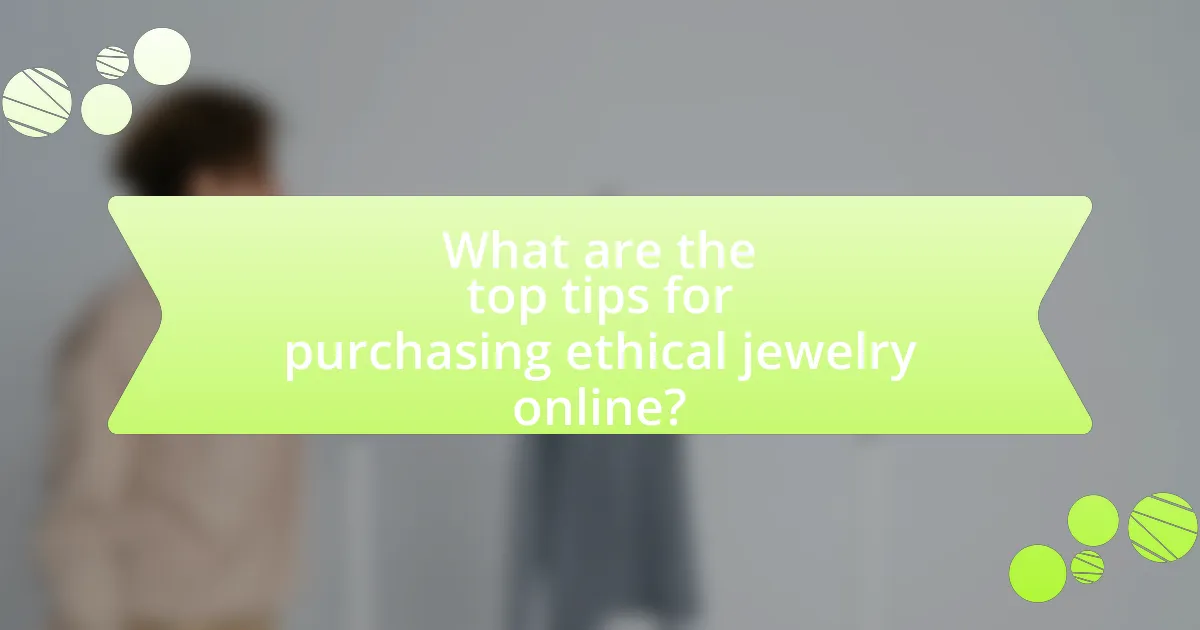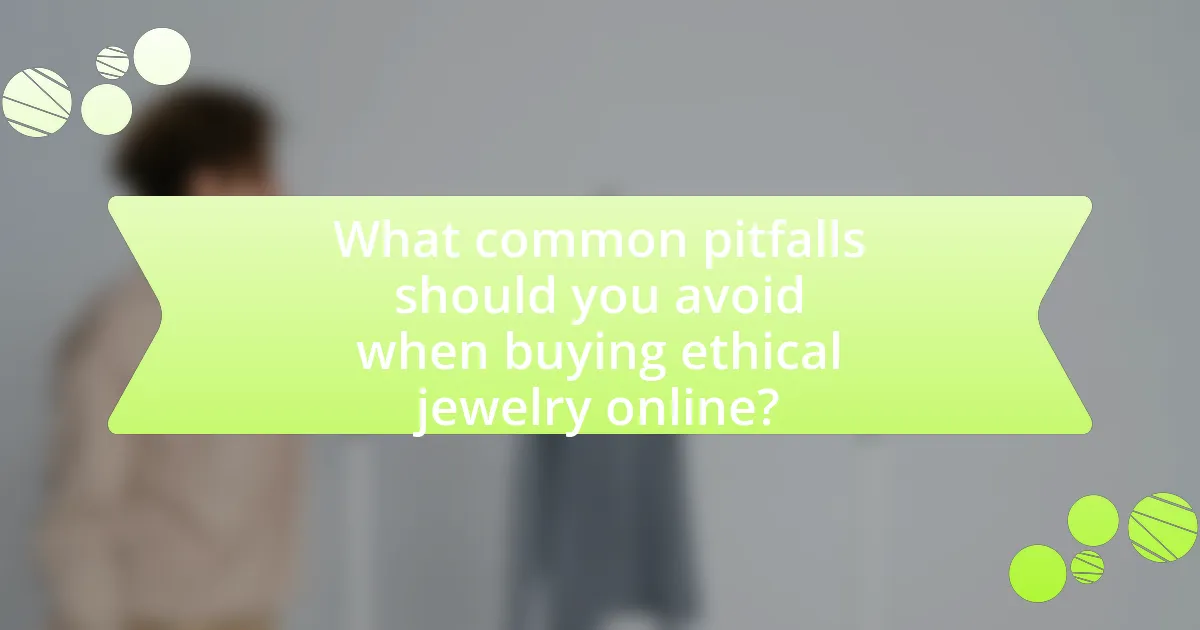The article focuses on the essential considerations for purchasing ethical jewelry online, emphasizing the importance of verifying material sources, understanding brand practices, and checking for certifications. It outlines the significance of ethical jewelry in promoting sustainable practices and fair labor conditions, while also detailing how to assess quality, identify reputable retailers, and avoid common pitfalls. Key tips include researching brands, examining customer reviews, and understanding pricing dynamics, all aimed at guiding consumers towards informed and responsible purchasing decisions in the ethical jewelry market.

What are the key considerations when purchasing ethical jewelry online?
When purchasing ethical jewelry online, key considerations include verifying the source of materials, understanding the brand’s ethical practices, and checking for certifications. Verifying the source ensures that materials like gold and gemstones are mined responsibly, minimizing environmental impact and supporting fair labor practices. Understanding the brand’s ethical practices involves researching their commitment to sustainability, fair wages, and community support. Certifications from recognized organizations, such as the Responsible Jewelry Council or Fair Trade, provide assurance that the jewelry meets established ethical standards. These factors collectively help consumers make informed choices that align with their values regarding ethical consumption.
Why is it important to choose ethical jewelry?
Choosing ethical jewelry is important because it ensures that the materials used are sourced responsibly, minimizing harm to people and the environment. Ethical jewelry often comes from suppliers who adhere to fair labor practices, avoiding exploitation and unsafe working conditions. For instance, the World Gold Council reports that responsible sourcing can reduce the negative impacts of mining on local communities and ecosystems. By selecting ethical jewelry, consumers support sustainable practices and contribute to a more equitable industry.
What defines ethical jewelry in the market?
Ethical jewelry in the market is defined by its commitment to sustainable sourcing, fair labor practices, and minimal environmental impact. This includes the use of conflict-free gemstones, recycled metals, and adherence to ethical labor standards, ensuring that artisans and workers receive fair wages and work in safe conditions. For instance, the Kimberley Process Certification Scheme aims to prevent the trade of conflict diamonds, thereby promoting ethical sourcing. Additionally, brands that are transparent about their supply chains and practices contribute to the definition of ethical jewelry, as they allow consumers to make informed choices.
How does ethical jewelry impact the environment and communities?
Ethical jewelry positively impacts the environment and communities by promoting sustainable practices and fair labor conditions. Sustainable sourcing of materials, such as recycled metals and conflict-free gemstones, reduces environmental degradation and minimizes carbon footprints. For instance, according to a report by the World Gold Council, responsible gold mining can reduce water usage by up to 50% compared to traditional methods. Additionally, ethical jewelry brands often support local artisans and communities, ensuring fair wages and safe working conditions. A study by the Ethical Fashion Forum highlights that ethical practices in jewelry production can lead to improved economic stability and social empowerment for marginalized communities.
What should you look for in an online jewelry retailer?
When selecting an online jewelry retailer, prioritize their commitment to ethical sourcing and transparency regarding materials. Ethical retailers often provide detailed information about the origin of their gemstones and metals, ensuring they are conflict-free and sustainably sourced. For instance, retailers certified by organizations like the Responsible Jewelry Council adhere to strict ethical standards, which can be verified through their certifications and policies. Additionally, look for customer reviews and ratings that reflect the retailer’s reputation for quality and service, as this can indicate their reliability and commitment to ethical practices.
How can you verify the authenticity of ethical claims?
To verify the authenticity of ethical claims, examine certifications and third-party audits from reputable organizations. Certifications such as Fair Trade, Responsible Jewelry Council, and Conflict-Free sourcing standards provide evidence that a brand adheres to ethical practices. Additionally, reviewing the supply chain transparency and sourcing information can further validate claims, as brands that disclose their suppliers and production processes demonstrate accountability. Researching customer reviews and independent reports can also reveal insights into a brand’s ethical practices, reinforcing the credibility of their claims.
What certifications should ethical jewelry have?
Ethical jewelry should have certifications such as Fair Trade, Responsible Jewelry Council (RJC), and Conflict-Free certification. Fair Trade certification ensures that the jewelry is produced under fair labor conditions and that artisans receive fair wages. The Responsible Jewelry Council certification verifies that the jewelry meets ethical, social, and environmental standards throughout its supply chain. Conflict-Free certification guarantees that the materials used, particularly gemstones, are sourced from regions free of conflict and human rights abuses. These certifications provide consumers with assurance regarding the ethical sourcing and production of the jewelry they purchase.
How can you assess the quality of ethical jewelry?
To assess the quality of ethical jewelry, examine the sourcing of materials, craftsmanship, and certifications. Ethical jewelry should be made from responsibly sourced materials, such as conflict-free diamonds or recycled metals, ensuring that the extraction process does not harm communities or the environment. High-quality craftsmanship is evident in the attention to detail, durability, and overall design of the piece. Certifications from recognized organizations, such as the Responsible Jewelry Council or Fair Trade, provide assurance that the jewelry meets ethical standards. These factors collectively indicate the quality and ethical integrity of the jewelry.
What materials are commonly used in ethical jewelry?
Ethical jewelry commonly uses materials such as recycled metals, ethically sourced gemstones, and lab-created diamonds. Recycled metals reduce the need for new mining, thereby minimizing environmental impact. Ethically sourced gemstones are obtained from suppliers who adhere to fair labor practices and environmental standards, ensuring that the stones are conflict-free. Lab-created diamonds offer a sustainable alternative to mined diamonds, as they are produced with significantly lower environmental costs and do not contribute to the ethical issues associated with traditional diamond mining.
How does craftsmanship affect the value of ethical jewelry?
Craftsmanship significantly enhances the value of ethical jewelry by ensuring high-quality materials and skilled artistry are utilized in the creation process. High craftsmanship reflects attention to detail, durability, and unique design, which are essential attributes that consumers seek in ethical jewelry. For instance, jewelry made by artisans who employ traditional techniques often commands higher prices due to the labor-intensive processes and the expertise required, which can include hand-setting stones or intricate metalwork. This level of craftsmanship not only elevates the aesthetic appeal but also supports sustainable practices, as many artisans prioritize ethical sourcing and fair labor conditions. Therefore, the craftsmanship involved directly correlates with the perceived and actual value of ethical jewelry in the marketplace.

What are the top tips for purchasing ethical jewelry online?
To purchase ethical jewelry online, prioritize researching the brand’s sourcing practices and certifications. Look for transparency regarding the materials used, such as recycled metals or ethically sourced gemstones, which are often certified by organizations like the Responsible Jewelry Council. Additionally, verify if the brand supports fair labor practices and sustainable production methods, as this information is typically available on their website or product descriptions. Engaging with customer reviews can also provide insights into the brand’s ethical commitments and product quality.
How can you research ethical jewelry brands effectively?
To research ethical jewelry brands effectively, start by examining their sourcing practices and supply chain transparency. Look for brands that provide detailed information about the origin of their materials, such as conflict-free gemstones and recycled metals. Verify their certifications, such as Fair Trade or Responsible Jewelry Council, which indicate adherence to ethical standards. Utilize online resources like ethical fashion directories and consumer reviews to gather insights on brand reputation and practices. Additionally, engage with social media platforms where brands often share their sustainability initiatives and community impact, allowing for a more comprehensive understanding of their ethical commitments.
What online resources are available for ethical jewelry research?
Online resources for ethical jewelry research include the Ethical Metalsmiths website, which provides information on sustainable practices and ethical sourcing in the jewelry industry. Additionally, the Responsible Jewelry Council offers guidelines and certifications for ethical practices among jewelers. The Fair Trade Jewelry Association promotes fair trade principles in jewelry production, while websites like Brilliant Earth and Catbird provide transparency about their sourcing and production processes. These resources collectively support informed decision-making for consumers seeking ethical jewelry options.
How can customer reviews influence your purchasing decision?
Customer reviews significantly influence purchasing decisions by providing insights into product quality and customer satisfaction. Research indicates that 79% of consumers trust online reviews as much as personal recommendations, highlighting their impact on buyer behavior. Positive reviews can enhance trust in a brand, while negative reviews may deter potential customers, particularly in niche markets like ethical jewelry, where transparency and authenticity are crucial. Therefore, analyzing customer feedback can guide consumers in making informed choices that align with their values and expectations.
What are the best practices for comparing prices and quality?
The best practices for comparing prices and quality involve conducting thorough research, utilizing price comparison tools, and assessing product specifications. Researching multiple retailers allows consumers to identify price variations and quality indicators, such as materials used and craftsmanship. Price comparison tools, like online aggregators, streamline this process by providing side-by-side comparisons of prices and features. Additionally, examining product specifications, including certifications and customer reviews, helps gauge quality. For instance, a study by the Consumer Reports National Research Center found that informed consumers who compare prices and quality are 30% more likely to make satisfactory purchases.
How can you identify fair pricing for ethical jewelry?
To identify fair pricing for ethical jewelry, research the cost of materials, labor, and the brand’s ethical practices. Ethical jewelry often uses sustainable materials and fair labor practices, which can increase costs compared to conventional jewelry. For example, the Fair Trade Gold standard ensures that miners receive fair wages and work in safe conditions, which can raise the price of gold jewelry. Additionally, compare prices across multiple ethical brands to gauge a reasonable price range. According to a 2021 report by the Ethical Jewelry Council, ethical jewelry typically ranges from 10% to 30% higher than non-ethical counterparts due to these factors.
What role do discounts and promotions play in ethical purchases?
Discounts and promotions significantly influence ethical purchases by making sustainable and ethically sourced products more accessible to consumers. When retailers offer discounts on ethical jewelry, they can attract a broader audience who may otherwise be deterred by higher prices associated with ethical sourcing practices. Research indicates that price sensitivity is a major factor in consumer purchasing decisions, with studies showing that 70% of consumers are more likely to buy a product if it is on sale. Therefore, discounts can effectively encourage consumers to choose ethical options over conventional alternatives, thereby promoting responsible consumption.
How can you ensure a secure online shopping experience?
To ensure a secure online shopping experience, use reputable websites that employ HTTPS encryption. HTTPS indicates that the site encrypts data exchanged between the user and the server, protecting sensitive information such as credit card details. According to a 2021 report by the Internet Security Research Group, over 80% of websites now use HTTPS, significantly reducing the risk of data breaches during online transactions. Additionally, always check for customer reviews and ratings to verify the legitimacy of the seller, as this can further enhance security by ensuring that you are purchasing from a trustworthy source.
What payment methods are safest for online jewelry purchases?
Credit cards and secure payment platforms like PayPal are the safest payment methods for online jewelry purchases. Credit cards offer fraud protection, allowing consumers to dispute unauthorized charges, while PayPal provides an additional layer of security by not sharing financial information directly with the seller. According to a 2021 report by the Federal Trade Commission, credit card fraud protection is a key reason consumers prefer this method, as it limits liability to $50 in cases of unauthorized use. Additionally, using secure payment platforms can reduce the risk of identity theft, as they encrypt sensitive information during transactions.
How can you protect your personal information while shopping online?
To protect your personal information while shopping online, use secure websites that employ HTTPS encryption. This ensures that data transmitted between your browser and the website is encrypted, making it difficult for unauthorized parties to access your information. According to a study by the Online Trust Alliance, 80% of consumers are more likely to shop on sites that display security indicators like HTTPS. Additionally, avoid using public Wi-Fi for transactions, as it can expose your data to hackers. Implementing strong, unique passwords for each account and enabling two-factor authentication further enhances security, reducing the risk of unauthorized access to your personal information.

What common pitfalls should you avoid when buying ethical jewelry online?
When buying ethical jewelry online, avoid the pitfall of not verifying the seller’s claims about ethical sourcing. Many retailers may label their products as “ethical” without providing transparent information about their supply chain, which can mislead consumers. Research shows that 60% of consumers are concerned about the ethical implications of their purchases, yet only a fraction actively verify these claims. To ensure authenticity, look for certifications from recognized organizations, such as Fair Trade or the Responsible Jewelry Council, which provide assurance that the jewelry meets ethical standards. Additionally, be cautious of overly low prices, as they may indicate compromised ethical practices in sourcing materials.
What are the red flags to watch out for in online jewelry listings?
Red flags to watch out for in online jewelry listings include vague descriptions, lack of certification, and unusually low prices. Vague descriptions can indicate a lack of transparency about the materials and craftsmanship, which is essential for ethical purchasing. The absence of certification from recognized gemological organizations raises concerns about the authenticity and quality of the gemstones. Additionally, prices that are significantly lower than market value often suggest that the jewelry may be of inferior quality or sourced unethically. These factors collectively help identify potential scams or unethical practices in online jewelry sales.
How can misleading marketing affect your purchase?
Misleading marketing can significantly distort consumer perceptions, leading to uninformed purchasing decisions. When jewelry brands employ deceptive advertising tactics, such as exaggerating the ethical sourcing of materials or misrepresenting the environmental impact of their products, consumers may believe they are making responsible choices. For instance, a study by the Federal Trade Commission found that 73% of consumers are influenced by marketing claims regarding sustainability, which can result in purchases that do not align with their values. This misalignment can lead to buyer’s remorse and a lack of trust in the brand, ultimately affecting the overall market for ethical jewelry.
What should you know about return policies for ethical jewelry?
Return policies for ethical jewelry vary by retailer, but generally, they prioritize customer satisfaction and sustainability. Many ethical jewelry brands offer a return window of 14 to 30 days, allowing customers to return items that do not meet their expectations. Some brands may also provide free return shipping to encourage responsible purchasing. It is essential to review the specific return policy of each brand before making a purchase, as policies can differ significantly. For example, a study by the Ethical Jewelry Association indicates that transparent return policies can enhance consumer trust and promote sustainable practices in the jewelry industry.
How can you avoid impulse buying when shopping for ethical jewelry?
To avoid impulse buying when shopping for ethical jewelry, create a budget and stick to it. Setting a specific financial limit helps prioritize purchases and reduces the likelihood of spontaneous decisions. Research indicates that consumers who establish a budget are less likely to make unplanned purchases, as they have a clear understanding of their financial boundaries. Additionally, making a list of desired items before shopping can further reinforce focus and intentionality, minimizing distractions that lead to impulse buys.
What strategies can help you make informed decisions?
To make informed decisions when purchasing ethical jewelry online, research the brand’s sourcing practices and certifications. Brands that are transparent about their supply chain and hold certifications, such as Fair Trade or Responsible Jewelry Council, demonstrate a commitment to ethical standards. According to a 2021 survey by the Ethical Consumer, 66% of consumers prioritize ethical sourcing when making jewelry purchases, indicating that informed decisions are increasingly influenced by brand accountability and transparency.
How can setting a budget guide your ethical jewelry purchases?
Setting a budget can significantly guide your ethical jewelry purchases by ensuring that you prioritize spending on brands that align with ethical practices. When you establish a budget, you can focus on researching and selecting jewelry made from sustainable materials, produced under fair labor conditions, and certified by ethical organizations. For instance, a budget allows you to filter options and avoid brands that may engage in unethical sourcing or labor practices, as evidenced by the Fair Trade certification, which guarantees that artisans receive fair wages and work in safe conditions. By adhering to a budget, you not only make informed choices but also support the ethical jewelry market, which is projected to grow as consumers increasingly demand transparency and sustainability in their purchases.
What final tips can enhance your ethical jewelry shopping experience?
To enhance your ethical jewelry shopping experience, prioritize researching the brand’s sourcing practices and certifications. Brands that are transparent about their supply chains and hold certifications from recognized organizations, such as Fair Trade or Responsible Jewelry Council, demonstrate a commitment to ethical standards. Additionally, consider supporting local artisans or brands that prioritize sustainable materials, as this not only reduces environmental impact but also promotes fair labor practices. Engaging with customer reviews and seeking out detailed product descriptions can further ensure that your purchase aligns with your ethical values.
How can you build a lasting relationship with ethical jewelry brands?
To build a lasting relationship with ethical jewelry brands, engage with them through consistent communication and support their values. Establishing a dialogue by asking questions about their sourcing practices and sustainability efforts demonstrates genuine interest. Supporting their initiatives, such as participating in events or sharing their mission on social media, reinforces your commitment. Research shows that brands with strong customer engagement see a 23% increase in customer loyalty, highlighting the importance of building rapport. By aligning your values with theirs and actively participating in their community, you create a foundation for a long-term relationship.
What are the benefits of joining ethical jewelry communities online?
Joining ethical jewelry communities online provides access to valuable information, support, and resources that promote responsible purchasing practices. These communities often share insights on sustainable materials, ethical sourcing, and fair labor practices, enabling members to make informed decisions. Additionally, participating in these groups fosters connections with like-minded individuals who prioritize ethical consumption, enhancing the overall shopping experience. Research indicates that consumers who engage with such communities are more likely to support brands that align with their values, thereby contributing to a more sustainable jewelry market.
